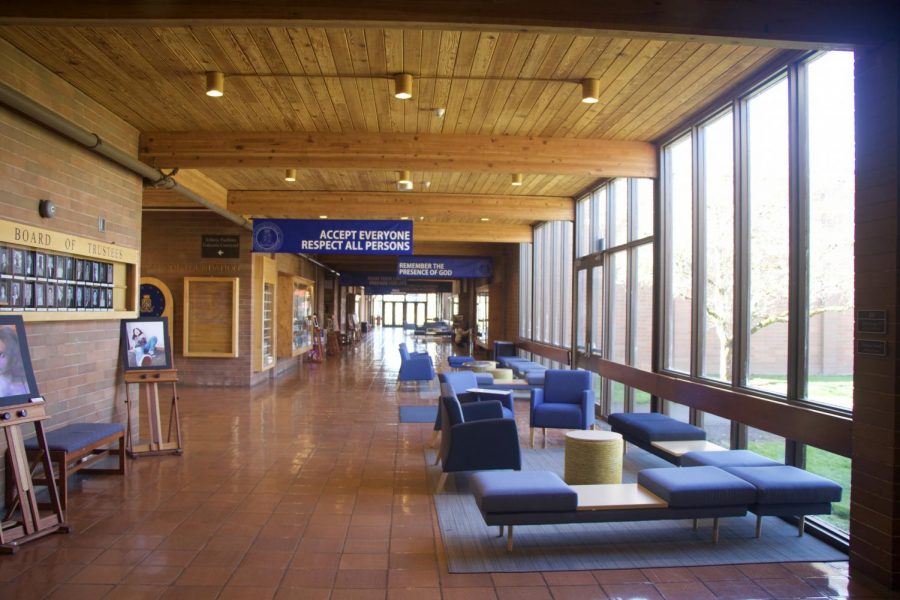A New Wave of Grading: Something La Salle Should Consider
With Governor Brown’s announcement this afternoon, the halls of La Salle will now remain empty for the rest of the academic year.
April 8, 2020
For me, an endless stream of Digital Learning Days (DLDs) seems like a strange dream, one where you’re not quite sure if you are asleep or awake. But for some, this is what they’ve always wanted. After all, for many students, this means staying in the comfort of their home, getting to wear comfy pajamas, and not falling behind with work as you would on sick days.
Now, the reality is that DLDs are all we can see until the end of the school year, whether we like it or not.
At La Salle and all around the country, teachers are being forced to take an entire block period of learning material and magically turn it into easily understandable homework for their students to learn or complete by themselves.
With challenging classes such as AP and honors courses, the idea of teachers saying, “Good luck! Here’s the material,” is frankly absurd. These difficult but necessary learning changes could make or break a student’s school year in one fatal swoop.
While being in school, students have the ability to talk directly with teachers to address concerns. However, with DLDs now occurring weekly, I have realized that there are many things that I have taken for granted.
A school environment, for example, is something so special. School allows you to put aside your home life, and to be able to focus on classes while also developing friendships.
But now, neither of those things are available due to COVID-19. So, how do we know if we are learning with the system of DLDs?
As a student, I don’t seem to work well with DLDs, and I can’t say I ever have. As a junior now, I’ve been through DLDs in the past and each time I feel as though I would do the assignments but never actually learn or obtain anything.
It’s almost like trying to fill a bucket that has a hole in the bottom with water. Ultimately, you are going nowhere.
I am an auditory learner, which is someone who learns best through listening and talking through concepts, as well as being able to ask a lot of questions. But it also means that getting assigned hours of reading and then assignments on top of that won’t be the most beneficial to my style of learning.
When I am working on math, I need to be able to ask why I got a question wrong, and I need to be led through the material in real time. I cannot read comments or chapters and understand them right away, such as a visual learner would.
Due to this barrier, I find myself scared and stressed about not only COVID-19 but also the integrity of my grades. Potential colleges are going to be examining my junior year transcripts very closely and a decline in grades due to DLDs wouldn’t be particularly impressive.
As our lives are quickly moving, it’s almost impossible not to get swamped and overwhelmed.
For some, academics aren’t the number one priority because of the pandemic, so due to that, their grades are being hit hard.
But this isn’t just seen in high school communities; it’s happening everywhere to students of all ages.
As college campuses get shut down, students are sent home and instantly glued to their laptops or iPads to complete piles of homework and class material. Classes that are built as hands-on, interactive courses are being shrunk down into the size of a screen where students have to learn through YouTube and Zoom chats and then are held to the same grading standards.
Many college students see the lack of balance between the quality of the online courses and the high grading standards.
The stress from COVID-19 on top of managing grades may be unrealistic and overwhelming. So, because of this, many schools are changing to a pass/fail grading system.
This means that rather than earning a traditional letter grade ranging from A-F, students will receive either a “P” for pass or an “F” for fail.
This strategy is already gaining traction in schools such as Harvard, Dartmouth, and Columbia.
Some colleges, such as the University of Arizona, give students the ability to choose the pass/fail grading system. Others are more strict, such as UCLA, and are making the system mandatory to promote equality.
This new grading option may seem extreme when first hearing it, but not so much when looking into it. Prescott College and some other colleges already use the pass/fail grading and have found success in it.
One thing that is important in understanding pass/fail grades is seeing both the pros and cons.
On the positive side, enforcing pass/fail grades is helpful for students who might not have the best grades, or whose grades have recently gone down because of the transition to digital learning. This would help someone like me, who learns better when in a school environment.
But on the negative side, a pass/fail system can take away from hard-working students who deserve recognition for their impressive grades. For example, if an “A” student works especially hard to get a good grade in a class, having the pass/fail system would not reward that students’ work.
The idea of implementing a pass/fail system to reduce stress for students shouldn’t be dismissed for our La Salle community.
I think this is an interesting option that La Salle should consider. It might help out students who don’t learn the best under these new DLD circumstances. It would also minimize the stress of getting perfect grades.
“As a school we want to do all that we can to support students during this unprecedented and unpredictable time, in which students and teachers [as well as] counselors are not together under one roof during the day, but rather with each in their own space interacting digitally,” said Mr. Mario De Ieso, the Vice Principal of Academics.
Currently, La Salle’s administrative team has implemented a pass/fail grading system of their own that falls under the same principles. They call it a credit/no credit system and it works the same way.
“We added the ability for those students that do not earn at least a ‘C’ minus in a specific class at the [end of the] semester to have the option [of the pass/fail grading system] with approval and conversation,” Mr. De Ieso said. “To opt for a credit/no credit grade rather than a letter grade… [will prevent] a failing grade or [a] ‘D’ from appearing on a student’s transcript.”
This option is one that students, when taking the right steps, can utilize to completely change the outcome of their grades.
Mr. De Ieso said that the option of credit/no credit is “not intended as a means by which a student can disengage from any class.” Rather, he said, it is a resource to “provide a further layer of support” for students who are struggling with digital learning. A student seeking the credit/no credit option must have that option approved by Mr. De Ieso after he has participated in “ongoing conversation throughout the semester with the student stakeholders,” which would be the student’s counselor, parents, and teachers, as well as the student themselves.
“Moving ahead, we are always evaluating, monitoring, and discussing how we are conducting school during these extended DLD days,” Mr. De Ieso said. “Now that Governor Brown has come [to a] decision that the school year will not resume in person, we are more frequently, often several times a day, connecting as a leadership team and are in discussion with our [staff] on how we might best support learning.”
Using pass/fail or credit/no credit grading instead of traditional letter grades might take unwanted stress away from students who don’t learn well with DLDs. As helpful as this new system is, it’s also important to notice that the students are able to use this new grading tactic if they have a D or lower.
Creating a system as helpful as this is something that should be available for all students, regardless of their grades. Having an open option for students to choose how they are graded would not only get rid of that stress for a final grade, but it would get rid of it before they were failing.






Maya • Apr 9, 2020 at 6:17 pm
Paige great article! I am thankful for your perspective and I fully agree with it, and I am also experiencing you same hardships and realizations about school. I am also glad to have more info about pass/fail grades but also what our school is doing as well. I applaud your work 😀